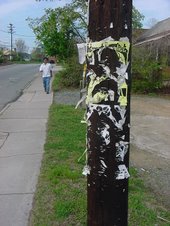
Chapel Hill Ordinance Sec. 16-3 (Placing notices, signs on
utility poles, trees, prohibited; exception.) No signs or notices for advertising purposes shall be fastened or tacked to telephone, telegraph or electric light poles or trees on the streets or sidewalks. However, the town manager may give permission for temporary signs to be placed on the streets or poles. (Comp. 1961, p. 44, § 3; Comp. 1961, pp. 51, 54)
utility poles, trees, prohibited; exception.) No signs or notices for advertising purposes shall be fastened or tacked to telephone, telegraph or electric light poles or trees on the streets or sidewalks. However, the town manager may give permission for temporary signs to be placed on the streets or poles. (Comp. 1961, p. 44, § 3; Comp. 1961, pp. 51, 54)
In 2002, after a local activist was detained, cited, found guilty and fined after posting flyers on Franklin Street for a Banquet for Global Peace and Justice being held in Carrboro, more than 1,200 citizens of Chapel Hill petitioned the Chapel Hill Town Council to repeal this misguided ordinance. The Chapel Hill Herald editorialized against the ban, and the Town Planning Board recommended that it be repealed.
In the end, the Town Council voted 6-3 to keep the ban (Council members Mark Kleinschmidt, Bill Strom and Ed Harrison were the only three members to oppose the ban, while Pat Evans, Flicka Bateman, Edith Wiggins, Dorothy Verkerk, Jim Ward, and Mayor Kevin Foy voted to keep it). Five years later, new council members have been elected, but the issue hasn't been revisited and the ban still stands.
In our own ways, we are all artists. As the Chapel Hill Herald pointed out, "the poles are used by dozens of people each day to let the community know about a concert, an apartment to rent or even a banquet for peace and justice" (CH Herald editorial, April 18, 2002). A law like this is contrary to the tolerance and free exchange of ideas that makes Chapel Hill such a special place. If you think we should be able to hang posters on telephone poles without fear of arrest, sign the on-line petition!
"We, the undersigned, request that the Chapel Hill Town Council revise or repeal Chapel Hill Ordinance Sec. 16-3 to allow the posting of signs or notices for advertising purposes on utility poles, in order to encourage free speech, artistic expression, and grassroots marketing by local businesses."
CLICK HERE TO SIGN THE ON-LINE PETITION!


